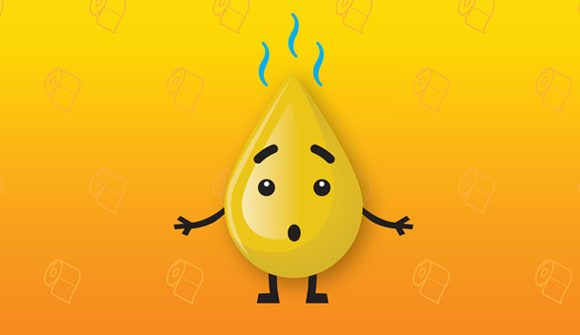Pee-yew!
What stinky wee may say about your health.
Article Date:

Liquid in, liquid out. That’s the cycle we repeat throughout the day (and night) when we urinate. But sometimes, the output may come with an unusual odor.
“Urine can give you good information about what's going on with your body,” said Justin Clark, MD, a family physician with Baptist Primary Care. “Food, vitamins, medication and hydration are some common factors that change your urine’s odor. But in some cases, that smell could be worth a discussion with your health care provider.”
Urine is primarily made up of water, with an extra dash of calcium, nitrogen, potassium and other waste products that have been filtered through the kidneys. Usually, this means your #1 doesn’t have much odor (unlike your #2).
What causes urine to smell?
If you’re getting a little more essence of wee after you pee, there are some common causes including:
- Dehydration: If the ratio of water to waste is off, there could be a stronger smell and darker color.
- Coffee or alcohol: The aroma of your morning coffee or evening cocktail may reappear during your subsequent visits to the bathroom.
- Vitamins, supplements and medication: Their smells may also reappear in your urine. Vitamin B and antibiotics are two common culprits.
What types of smells should I worry about?
In some cases, you may notice stronger or more unusual smells, which could indicate something more serious.
Ammonia
- Common cause: A urinary tract infection (UTI), particularly if the urine is also cloudy or bloody, it's painful to urinate or you feel the need to go more often. "This is more common in women because of their anatomy, but men can also experience UTI-like symptoms due to natural prostate gland changes as they age," said Dr. Clark.
- More serious considerations: Kidney stones or kidney disease, liver disease, menopause, prostate infection or sexually transmitted diseases.
Fish or rotten eggs
- Common causes: What you're eating, like asparagus, garlic or onions. In women, it could be bacterial vaginosis, a type of inflammation caused by excessive bacteria in the genital region that may cause a fishy-smelling discharge.
- More serious considerations: Rare metabolic disorders such as fish odor syndrome (trimethylaminuria) in adults or tyrosinemia type I, II or III in children. Both are extremely rare and caused by the body's inability to break down certain proteins or amino acids in the body.
Fruity or sweet
- Common causes: Yeast infection, diabetes or high blood sugar (hyperglycemia). "Uncontrolled or undiagnosed diabetes could result in frequent urination and a sweet smell because that's the body's way of processing sugar," said Dr. Clark.
- More serious considerations: In newborns, it could be maple syrup urine disease, a rare metabolic disorder.
When should I see a doctor?
Dr. Clark said if your smelly urine disappears in a day or two, it's likely nothing to worry about. But if it lingers, worsens or comes with other symptoms, contact your primary care physician.
"It's about knowing what's normal for you and checking with your physician if something is happening outside of that," he said.
Some patients may be shy about discussing urinary concerns. To this, Dr. Clark stressed: "Don't be embarrassed to ask your doctor about weird odors! We want you to be open with us. Just tell us what's happening, and we'll address it. That's what we're here for."
Still worried about urine odor?
Talk to your primary care physician if you have questions about your urinary health. If you're looking for a doctor, click here to find a provider near you or schedule an appointment online.



